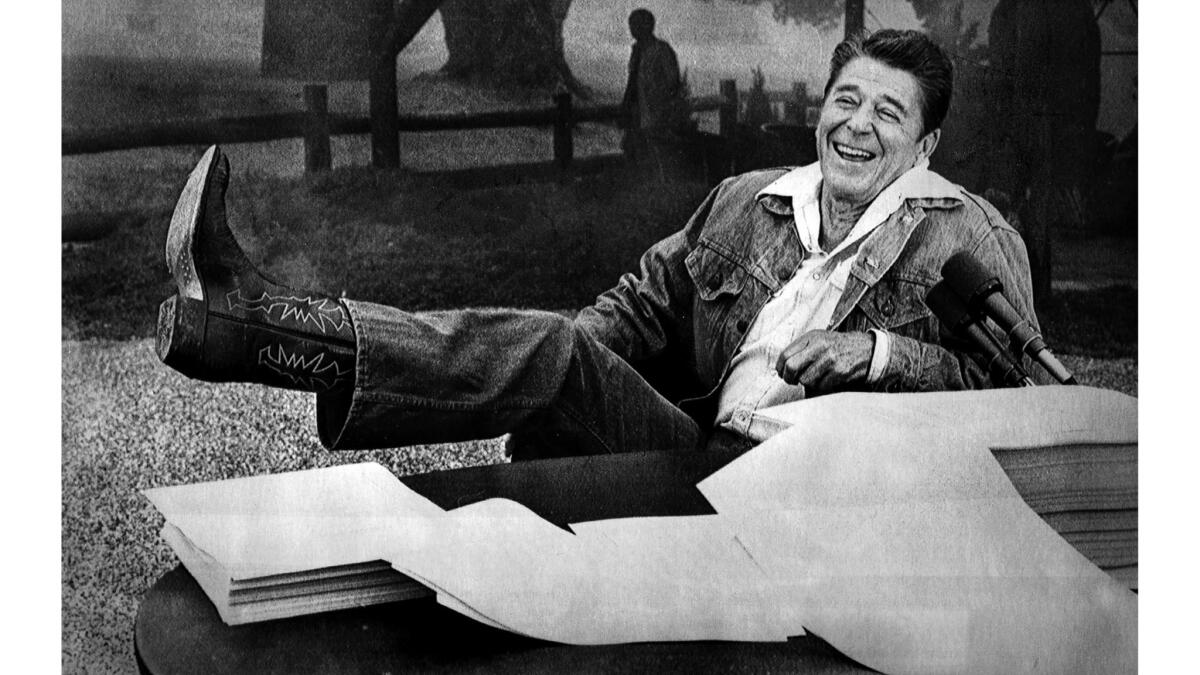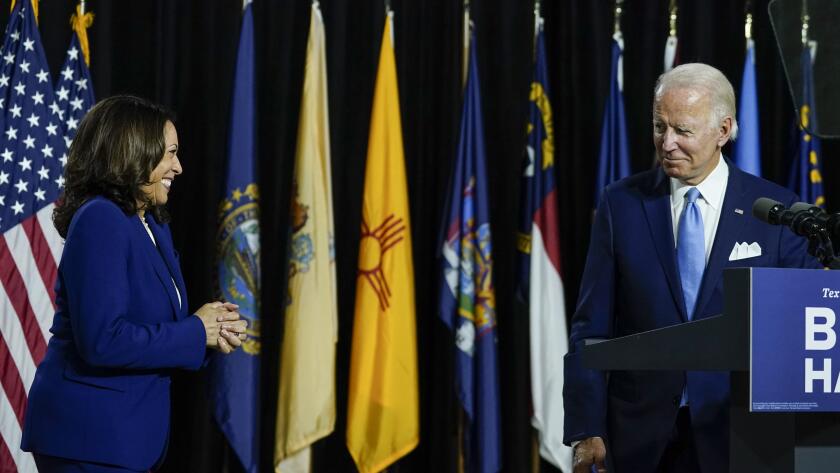Newsletter: The Biden-Harris connection
- Share via
- Share via
Inside Joe Biden and Kamala Harris’ first appearance on the Democratic ticket.
TOP STORIES
The Biden-Harris Connection
In a Wilmington, Del., high school gymnasium, Joe Biden and Kamala Harris made their debut as a presidential ticket, introducing their unconventional political partnership and promising a purposeful approach to the weighty challenges facing the nation and their bid to defeat President Trump.
They walked onstage together in a sign of the pandemic times — wearing black masks and blue suits, maintaining social distance as they traded off turns at the podium, without the usual crowds to cheer them on.
Start your day right
Sign up for Essential California for the L.A. Times biggest news, features and recommendations in your inbox six days a week.
You may occasionally receive promotional content from the Los Angeles Times.
It was the first time the presumptive Democratic nominee offered at-length insights into why he chose Harris, California’s junior senator, as his running mate, making her the first Black woman and first Asian American poised to be nominated for vice president by a major party. The choice, he said, was all the more serious given the consequences of this election — and he had “no doubts” that he made the right pick.
Harris, in turn, laced into Trump’s handling of the coronavirus pandemic and blamed him for the swelling numbers of unemployed Americans.
Wednesday’s event marked the culmination of Biden’s protracted search for a running mate, which took sharp turns as the nation struggled with a pandemic and erupted in protest following the killing of George Floyd, as this inside account details.
Trump and his Republicans allies have begun blasting Harris as “Phony Kamala” as well as “a California progressive radical.” Until Harris got the nod from Biden, the White House had largely tamped down its anti-California jibes during the coronavirus pandemic.
The Second Surge
California’s second surge of the coronavirus has resulted in a near doubling of weekly deaths since the spring — with almost 1,000 fatalities in the last week alone — and radically shifted the geography of the outbreak, a Times data analysis found.
Suburban and agricultural areas that had been relatively spared during California’s first surge of the virus are now being ravaged. And urban areas such as Los Angeles County and the San Francisco Bay Area are reporting fatality numbers just as high, if not higher, than in the spring.
The Central Valley has become home to one of the worst coronavirus hot spots in the country. In eight southern Central Valley counties, weekly COVID-19 deaths have jumped from about 20 a week in April to nearly 200 a week in the last two weeks, a Times analysis found. San Joaquin Valley residents make up 20% of recent deaths statewide, even though they account for about 10% of the state’s population.
More Top Coronavirus Headlines
— With hospitalizations of coronavirus patients dropping in California, officials expressed some cautious optimism that the state is making progress in its fight against the pandemic, even as a significant backlog in test results continues to distort the actual number of infections confirmed throughout the state.
— At least 15,800 essential workers would not have contracted COVID-19 if California had stockpiled enough masks and other protective equipment, while the state would have saved $93 million weekly on unemployment claims, according to a new study.
— A judge declined to order the immediate closure of a Ventura County church that has been holding indoor worship services in defiance of coronavirus-related health orders and despite a court order barring it from doing so.
— “Yes, it really sucks”: Columnist Bill Plaschke writes about his bout with COVID-19.
For more, sign up for Coronavirus Today, a special edition of The Times’ Health and Science newsletter.
The WeChat Way
For millions of people around the globe, and in swaths of the United States with concentrated Chinese populations — including Southern California communities in the San Gabriel Valley and Irvine — WeChat is a way of life.
It combines the functionality of Facebook, Whatsapp, Venmo and more. But with the Trump administration targeting the app, many users in Southern California worry they will be cut off from their cultural community in the U.S. and lose the last line of communication they have with the rest of their family thousands of miles away.
While Trump’s executive order barring business transactions with WeChat and TikTok was vague and its impact remains unclear, experts say it could cause the WeChat app to be pulled from Apple and Google online stores when it goes into effect in fewer than 45 days.
FROM THE ARCHIVES
In 1981, a rat infected with the bubonic plague was found in Santa Barbara, near a ranch owned by President Ronald Reagan. Health officials recommended residents in the area tuck their pant legs into their boots to protect themselves against the disease.
On Aug. 13, 1981, Reagan held a news conference at the ranch, where he was asked by reporters about the plague threat. Reagan smiled and held up his leg, displaying his boot and proudly untucked pant leg. A Times photographer captured the moment and it ran in the next day’s paper. Reagan signed an economic tax relief bill and budget later in the news conference.

Want more of the Los Angeles Times archives? We’re on Instagram.
CALIFORNIA
— A fast-moving brush fire broke out near Lake Hughes in northern Los Angeles County, prompting mandatory evacuations.
— Los Angeles police are investigating a possible prank call that led to the department’s heavily armed SWAT team descending on the block of one of the city’s leading Black Lives Matter activists.
— More than a month after Los Angeles City Councilman Jose Huizar was charged in a political corruption probe and suspended from the council, Council President Nury Martinez has set out plans for a “caretaker” to manage Huizar’s district until former state Senate leader Kevin de León is appointed in October.
— Morrie Tobin, the L.A. financier who tipped federal authorities in Boston to William “Rick” Singer’s college admissions scam, has been sentenced to a year and a day in prison for selling stock at fraudulently inflated prices to unwitting investors.
Support our journalism
Subscribe to the Los Angeles Times.
NATION-WORLD
— A revamped PPP loan program is in the works. Will it help the small businesses left out of the last iteration?
— The Trump administration has canceled plans to open tens of thousands of acres for oil and gas drilling near three national parks in Utah next month, a victory for environmentalists and residents angered by its proposal.
— A passenger train derailed in northeast Scotland after stormy weather, killing three people and injuring six others Wednesday.
HOLLYWOOD AND THE ARTS
— The rebirth of Katy Perry: “I was kind of born into chaos,” she says. “So I thrive in it.”
— Trump is coming to Netflix. Sort of. Comedian Sarah Cooper, who found internet fame lip-syncing to his public statements, is getting her own comedy special on the streaming service.
— Some might be confounded by FX’s hit mockuseries “What We Do in the Shadows,” a surprise Emmy nominee for comedy series. But its brain trust insists there’s nothing to be confused about — at least nothing a toothpick and a pair of jeans can’t fix.
— Sumner Redstone, the pugnacious Hollywood titan who controlled media giants Viacom and CBS, has died at his home in Los Angeles after a lengthy illness. He was 97.
BUSINESS
— Uber and Lyft might temporarily stop their operations in California over a labor fight. That may help them in November, when Proposition 22 comes before voters.
— Hotels, airlines, car rental companies and sports arenas have teamed up with the makers of popular disinfectants, hoping the squeaky clean reputations of Clorox and Lysol will vouch for their cleaning protocols.
SPORTS
— College football in the spring presents its own set of coronavirus and scheduling problems.
— James Goldstein is one of L.A.’s most recognizable NBA superfans, and even he can’t get into the bubble.
Free online games
Get our free daily crossword puzzle, sudoku, word search and arcade games in our new game center at latimes.com/games.
OPINION
— COVID-19 closures have trapped thousands of children at home with their abusers. We need better tools to identify and help them amid school closures before it’s too late, writes Angelina Jolie.
— Trump’s bogus executive actions are reality TV, not real governing, writes columnist Doyle McManus.
WHAT OUR EDITORS ARE READING
— How Jared Kushner and Kanye West are connecting “almost daily.” (Forbes)
— The language we use to describe human bodies says a lot about how we view them. Here’s what some of the most popular literature has to say. (The Pudding)
ONLY IN L.A.
In many ways, L.A. is a natural for mural-gazing. Often traffic-choked, its slow-moving crawl can create a kind of art gallery for murals along busy streets. It’s no surprise, then, that public art has become the tool of choice for activists in the summer of Black Lives Matter. “Public art and murals are a way for people to take ownership of their communities,” artist Alexandra Allie Belisle said.
Comments or ideas? Email us at headlines@latimes.com.
Sign up for Essential California
The most important California stories and recommendations in your inbox every morning.
You may occasionally receive promotional content from the Los Angeles Times.




